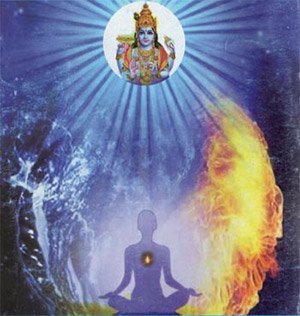Siddhanta Sangraha of Sri Sailacharya
by E. Sowmya Narayanan | 2008 | 30,562 words
Siddhanta Sangraha Chapter 37 (English translation), entitled “some speciality of verbal testimony” as included in the critical edition and study. The Siddhanta Samgraha is a Sanskrit philosophical text dealing with Vishishtadvaita in five hundred Sanskrit verses. It was written by Shri Shailacarya (18th century) and closely follows the philosophy of Vedanta Deshika (13th century).
Chapter 37 - Some Speciality of Verbal Testimony
378-380. Those who disagree with the validity of the Pāñcarātra are only the person with ignorance, jealousy and hatredness. In the statements such as ‘nīla gauḥ’ and ‘gaurnīla’ the validity of the verbal testimony is established as the one which is not different from Blueness through samāsa and vigraha respectively.
381. According to the Nyāya Vistara text, the import of the ling expression in ‘yajeta’ is that it is only a ‘karaṇa’ (instrument). But the real import is that it conveys or prompts a puruṣa or a person towards accomplishing the desired end.
382. It has been clearly stated through the statements such as “somena yajeta”, ‘yāvajjīvam agnihotram juhoti’ the validity of the verbal testimony is expressed in both Instrument and Accusative forms.
383. Only specific cases, where it cannot be explained in the above manner an alternative explanation is to be resorted. Thus the validity of the verbal testimony is explained.
Conclusion:
 This concludes Some Speciality of Verbal Testimony according to Vishishtadvaita philosophy explained by Shri Shailacarya. This book follows the model of Vedanta Deshika although the Vishishta Advaita school was originally expounded by Shri Ramanuja. Vishishta-Advaita is one of the various sub-schools of Vedanta which itself represents one of the six orthodox schools of Hindu Philosophy. They highlight the importance of the Upanishads, the Bhagavad Gita and the Brahma Sutras.
This concludes Some Speciality of Verbal Testimony according to Vishishtadvaita philosophy explained by Shri Shailacarya. This book follows the model of Vedanta Deshika although the Vishishta Advaita school was originally expounded by Shri Ramanuja. Vishishta-Advaita is one of the various sub-schools of Vedanta which itself represents one of the six orthodox schools of Hindu Philosophy. They highlight the importance of the Upanishads, the Bhagavad Gita and the Brahma Sutras.
